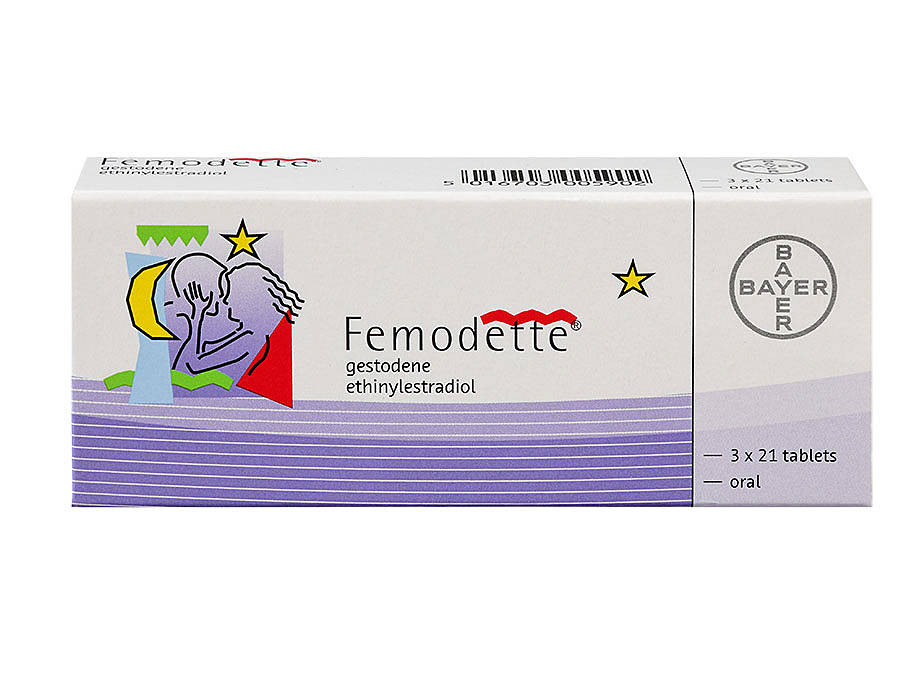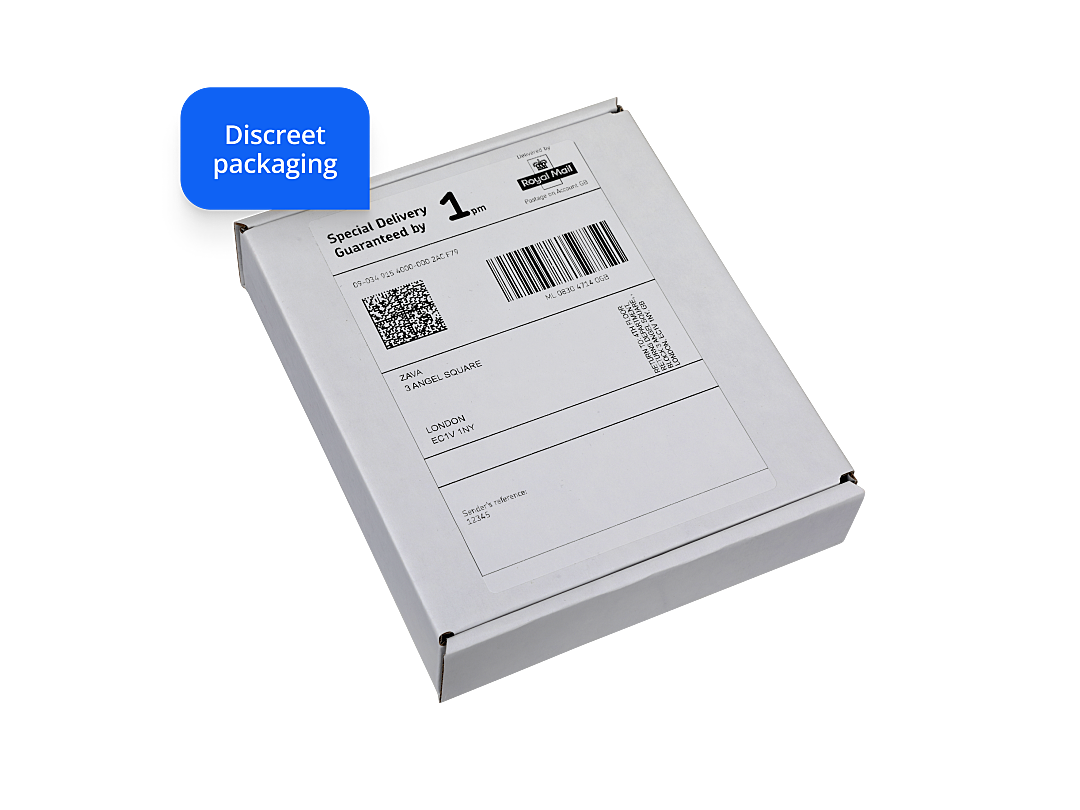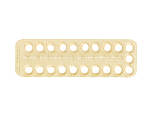





Prices from £19.99
In stock. Simply fill in a brief consultation questionnaire and one of our doctors will review your request today.
-
Femodette is a low-dose oestrogen ‘third generation’ oral contraceptive pill which contains the man-made hormones ethinylestradiol and gestodene. It’s designed to have fewer side effects and could be a suitable choice for you if you’ve been having trouble with the side effects of other contraceptive pills.
You can reorder your Femodette easily online with ZAVA. Fill in a short online assessment and place your order. A UK-registered doctor will check your order is right for you and if it is, it can be sent to your door, or to a local post office to pick up.



About Femodette
-
-
Femodette is a ‘third generation’ combined hormonal contraceptive, also known as ‘the Pill’ or combined oral contraceptive. It’s designed specifically to prevent pregnancy and is 99% effective when used correctly.
There are two active ingredients in Femodette – ethinylestradiol (75 micrograms), and gestodene (20 micrograms). These ingredients work as made-man versions of the female sex hormones oestrogen and progesterone.
Femodette is taken for 21 days (1 tablet per day) starting on the first day of the menstrual cycle. Then it’s stopped for 7 days, where you’ll experience some breakthrough bleeding.
We offer sets of pills for 6 months (6 x 21 tablets) and for 3 months (3 x 21 tablets). Your online doctor or GP can help you decide which set is best for you if you’re unsure.
-
-
- Femodette comes in strips of 21 pills, each marked with the day of the week
- You need to take the pill at the same time every day. E.g. if you take it in the morning at breakfast, always take it at that time
- You should begin taking Femodette by taking the pill that corresponds with the day you want to begin. So if it’s Monday, take the pill marked ‘Monday’
- Don’t chew the pill – swallow it whole with water
- After you have taken all 21 pills in the pack, you then need to take a 7-day break
- In the next day or so, you’ll start something called a ‘withdrawal bleed’ which will be similar to a period
- When you start taking the next set of pills, the bleeding may not have finished yet. That’s nothing to worry about, and you can start taking them again
-
-
Follow these 5 steps if you miss a pill:
- If you forget to take your pill or miss it at the usual time, you should take it as soon as you remember
- You should take the most recently missed pill as soon as you remember, even if it means taking two at once
- Any earlier missed pills should be left in the pack
- You should continue taking the Pill every day at your usual time for the next 7 days
- If you come to the end of a set of pills during these seven days, you should continue taking the next set and don’t take the usual 7-day break
What to expect if you miss a pill:
- If your pill is less than 24 hours late, and you’ve taken it straight away, you should still be protected from pregnancy
- If you have missed 2 or more pills, your risk of pregnancy will have increased and you’ll need to use additional contraception like a condom for 7 days. Don’t take any extra pills to try and avoid pregnancy
- Don’t worry if you don’t have the ‘withdrawal bleed’ – that’s normal. But, if you finish the second strip of pills and don’t have a bleed and have had sex, do a pregnancy test before taking the next set of contraceptives
We recommend that you use extra contraception for seven days after missing 2 or more pills at any time. This could be a barrier method, like condoms. If you’ve already had sex in the week that you missed two or more pills , it is possible that you could become pregnant. You should speak with your GP or online doctor for advice as soon as possible. They may recommend that you use the emergency contraceptive pill.
-
-
Femodette is prescribed on the NHS and recognised and licensed for use in the UK by the Medicines and Healthcare products Regulatory Agency, who are part of the government and responsible for regulating all medications in the UK.
-
-
It’s been commonly reported that combined hormonal contraceptive pills like Femodette have side effects that include a depressed mood. The link between depression and contraception has not been proven or disproven. However, if you experience depression whilst on Femodette for the first time, do discuss this with your doctor. They can help you decide whether or not to stay on this pill or try another formulation or another contraceptive that doesn’t have hormones.
If you have a diagnosis of depression, you might want to speak with a doctor about your concerns and diagnosis. Low mood effects from the contraceptive pill can vary a lot from person to person, and discussing it with your GP or online doctor could help you decide on the right choice of contraceptive.
-
-
There’s no evidence that birth control pills such as Femodette cause you to lose or gain weight. But you should speak with your doctor if you’re worried that Femodette is affecting your weight.
Being very overweight can make the Pill unsuitable for you. If you have a BMI of 35 or over then you should talk to your doctor about switching contraceptives.
Weight gain can be managed by:
- Exercising regularly
- Eating healthily
- Limiting junk foods
- Drinking water regularly
If you’re uncomfortable or concerned about weight gain, talk with your doctor as they may decide to prescribe alternative contraceptive options.
-
-
To order online, you need to:
- be at risk of unwanted pregnancy
- be 18 years old
- live in the United Kingdom
- be using your Femodette for contraception, and not for improving hormonal conditions like PMS or acne
- have been using Femodette for at least 3 months and be happy with your treatment
- not have any health conditions or medications that would make Femodette unsafe to take
-
-
It is easy and simple to order Femodette online from ZAVA:
- Medical questionnaire: answer a few simple questions about your health
- Doctor review: one of our UK registered doctors confirms your suitability
- Fast, discreet delivery: your medicine or test kit is dispatched by our pharmacy if it’s right for you
-
-
As with all oral, hormonal contraceptive pills, Femodette can cause side effects. These include:
- feeling sick
- stomach (abdominal) Pain
- headache
- breast tenderness
- low mood
- weight gain – this is only temporary and is caused by water retention, not by changes to body fat
Femodette has a lower oestrogen level than some of the other types of contraceptive pills, which means that you might not have as many of these side effects compared to other pills. It is often recommended if you are experiencing side effects with the pill that you’re already using.
The full list of the common and uncommon side effects of Femodette can be found in the patient leaflet. Please read through it carefully, and if you experience any serious side effects like vomiting or chest pains, get emergency medical help as soon as possible.

Dr Kathryn Basford is a qualified GP who works as a GP in London, as well as with ZAVA. She graduated from the University of Manchester and completed her GP training through Whipps Cross Hospital in London.
Meet our doctorsLast reviewed: 11 Feb 2019
-
British National Formulary (2018) Ethinylestradiol and Gestodene. [online] Available at: https://bnf.nice.org.uk/drug/ethinylestradiol-with-gestodene.html [accessed 27 November 2018].
-
British National Formulary (2018) Contraceptives, hormonal. [online] Available at: https://bnf.nice.org.uk/treatment-summary/contraceptives-hormonal.html [accessed 27 November 2018].
-
Faculty of Sexual and Reproductive Healthcare (2016) CEU response to published study: association of hormonal contraception with depression. [online] Available at: https://www.fsrh.org/standards-and-guidance/documents/ceu-response-to-published-study-association-of-hormonal/ [accessed 28 November 2018].
-
Medicines.org (2018) Femodette. [online] Available at: https://www.medicines.org.uk/emc/product/3798/pil [accessed 27 November 2018].
-
NHS (2017). Combined pill. [online] Available at: https://www.nhs.uk/conditions/contraception/combined-contraceptive-pill/ [accessed 27 November 2018].
Contraceptive pills are a reliable way of reducing your risk of getting pregnant from sex. ZAVA offers most common brands of pill, so you can order your preferred brand by visiting our contraceptive pill service page.
In stock. Prices from £19.99








